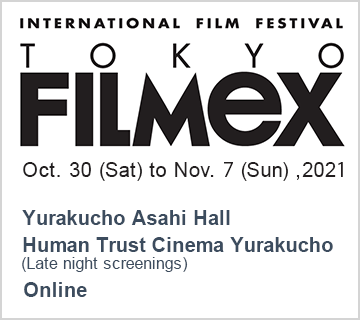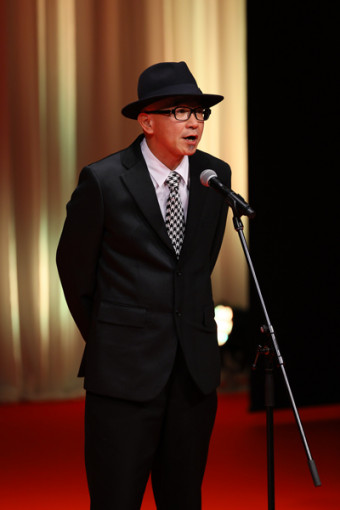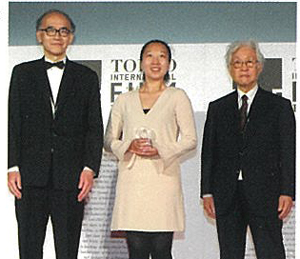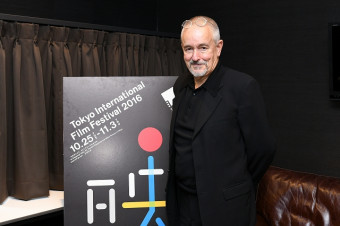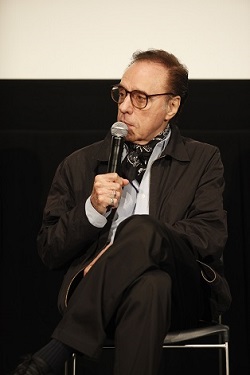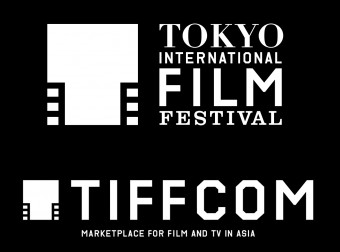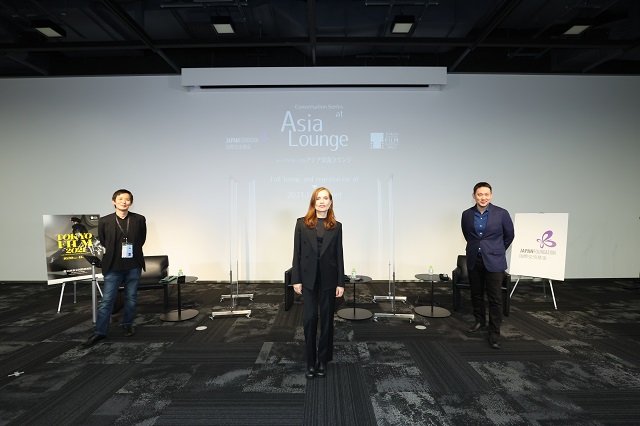
The second year of the Conversation Series at Asia Lounge got underway at Tokyo Midtown Hibiya on October 31, on Day 2 of the 34th Tokyo International Film Festival (TIFF).
Co-presented by the Japan Foundation and TIFF, with an advisory panel once again headed by Palme d’Or winner Kore-eda Hirokazu, the series will be bringing together acclaimed filmmakers from Asia and beyond to engage in friendly dialogue with their Japanese counterparts each afternoon from October 31 to November 7.
While originally conceived as a place where filmmakers could interact and attend talk sessions in person, due to the ongoing pandemic, the Asian Lounge is once again featuring both in-person and online guests, and audiences will be able to livestream each of the talks on TIFF’s official YouTube channel.
Kore-eda was on hand to introduce multi-award-winning screen and stage actress Isabelle Huppert, who is in Tokyo to serve as the TIFF International Competition Jury President, and acclaimed director/screenwriter Hamaguchi Ryusuke, whose star has been burnished this year with the Silver Bear Grand Jury Prize at the Berlin International Film Festival for his anthology film Wheel of Fortune and Fantasy, and a shared Best Screenplay Award at the Cannes Film Festival for Drive My Car.
Kore-eda thanked Huppert for making the time in her busy schedule as Jury President to appear. He told Hamaguchi, “I saw your film at the opening of the FILMeX film festival yesterday, and it made me jealous as a filmmaker, you’ve made such a wonderful film.” Before he took a seat in the audience, he couldn’t resist adding, “It was my idea to bring these two together, since I thought it would be a wonderful pairing.”
Moderator Tsuchida Tamaki, an academic and Program Coordinator at Yamagata International Documentary Film Festival, then took over. “We’re so grateful that Ms. Huppert could be here, because it’s not easy to come to Japan under the pandemic conditions. Mr. Hamaguchi’s name was the first name that came up when we were considering who should be the host during this discussion. He has a wonderful track record and we believe he’s going to be a prominent figure who will drive the Japanese film world.”
Asked for comments about each other’s work, Huppert said, “I’ve seen almost all of Mr. Hamaguchi’s films, all the ones I could see in France. It’s difficult to choose just one to discuss, but he has a powerful filmic expression; he always picks up a prominent film message. He understands what happens in those moments when people are able to express themselves in words or when they are instead silent.”
Hamaguchi thanked her and admitted, “I feel like my brain’s melting right now, I’m so honored to be here today. Ms. Huppert is such an accomplished actress, and her filmography is so rich. I think she acts her roles so naturally, as if she’s existing within the films, her presence is so strong. To have such a presence in front of the camera [is amazing]. One recent film I saw her in is Paul Verhoeven’s Elle, which is very complicated, and Ms. Huppert’s character is very complex. The film begins with a rape, and then she begins a relationship with the rapist. She seems to have understood the role in the depths of her soul.”
“I believe she’s in seven of Claude Chabrol’s films, of which I’ve only seen six, but she seems to have an understanding of evil and pain, which is what the world is all about, and to be able to express this. I’d like to ask a question about Mr. Chabrol as a director; what are your thoughts about working with him, as well as with Mr. Verhoeven?”
The actress thanked him for the compliments and responded, “As for good and evil, these are always repeated themes in Claude Chabrol’s films. He doesn’t try to idealize the world, or to depict things in a black and white way. Human beings are fallible, but it’s not their fault, it’s the fault of circumstances, which may bring evil out of them. The world that he shows is unfortunately the world that we live in. For me as an actress, it’s a good environment to work in.”
“When I worked on Elle with Mr. Verhoeven,” she continued, “he actually told me that he couldn’t relate anything that I didn’t already know about the character, since I’m a woman. There’s a certain spiritualism, a certain truth that the film exudes. I think that both directors are able to show us what the actor is thinking, and this is something rare. But in such films at Happy Hour, you can see what the actor thinks. One of the actresses, who’s always looking down, you can sense exactly what she’s thinking. It’s quite a vocal kind of acting.”
Said Hamaguchi, “I think all the actors in Happy Hour are wonderful, and it makes me happy that you could see their spirituality and sentiment. When you act, Ms. Huppert, your expressions are very nuanced. Sometimes there’s an explosion of emotion, but there’s a certain stillness that runs through the films that you appear in. You harbor the ability to explode at any minute, which is a remarkable achievement. Actors have to be able to react to what is happening, and when you stand in front of the camera, what is the process that you’re approaching the scene with?”
“I think it has to do with how much you trust the film; how much you believe in it,” answered Huppert. “You spoke about being active and being passive, and depending on the film, we’re manipulated to move in front of the camera because of the film itself. We have to remember that film and psychological analysis were developed at the same time, and they’re both very powerful.”
“As to silence and dialogue, in one of Honoré de Balzac’s novels, there’s a character who can’t express everything in words, so there’s a subconscious world. I think cameras also capture the subconscious world. They’re very powerful. The camera will search inside our soul. If there’s too much facial expression, it’s maybe because an actor is too anxious. The camera picks up all the emotions and the movements, and it may make a performance artificial.”
She then said, “I’d like to ask about the four actresses in Happy Hour. I read somewhere that they were amateurs, is that true?” Receiving confirmation, she went on, “That’s extraordinary. It’s an amazing thing to see amateurs act in such a professional way — it feels like we professionals should just stop. Those women didn’t feel like actors. That type of innocence is something we professionals always want to recapture.”
Hamaguchi once again thanked Huppert for the praise, saying that he felt the same way. “I’ve been in the film industry for 20 years and I’m starting to realize more and more just how powerful film is,” he said. “It can capture so much, sometimes too much. I think physical dialogue is expressed without using words, and when the camera’s there to depict it, it’s captured. So as a director, I have to believe that the actor will depict what needs to be depicted, that the camera will pull this essence out of them.”
“I’ve worked with professionals on my last three films, and they also bring a lot of value to the characters. They’re able to convey the spirit and to do it authentically. But actors can’t always do what they think they can do. Jean Renoir always reads through the script with his actors, without expression, and this is something I always do this myself.”
He then asked Huppert, “Your expression at the end of Claude Chabrol’s Merci pour le Chocolat really defines the film. I wonder if you can tell me what you’re thinking, where you are spiritually and mentally, when you stand in front of the camera?”
She answered, “When it comes to reading through the script in that way, like the Italians do, it’s very mechanical, allowing us to abandon ourselves, and it does lead to a certain kind of truth. As Maurice Pialat said, what happens right before the camera starts and right after it stops rolling is the most truthful of all moments. I’ve never felt any kind of trepidation before the camera. I’m very detached from the process. In that moment, I don’t have to think about anything in order to act the role.”
Noted Hamaguchi, “This brings us back to having a confidence in cinema, confidence in the camera. So that’s how you grasp your role? That makes a lot of sense.”
“Since film is one language, the director talks through the actors through the camera position,” Huppert explained, “and the actor is very aware of this. If the camera’s far away, the body’s expression matters. If it’s close, it’s the eyes that matter. There are certain times when I’m not sure what the director’s trying to achieve, but the camera position provides the answer.”
Hamaguchi was reminded of his own mentor, Kurosawa Kiyoshi, who had told him something similar about camera positioning. “As I work with my own actors,” he said, “I realize that film is made of this intricate dialogue between the actor and the camera.”
During the Q&A period that followed the discussion, both guests were asked whether they feel there is any difference between acting on stage and in film.
“Watching Mr. Hamaguchi’s film Drive My Car,” noted Huppert, “I became interested in how many theatrical aspects are included in the film (which concerns a theater director who is mounting a multilingual Chekov play), and how you were trying to capture theater through the camera. Did you do this because you love theater?”
Said Hamaguchi, “I don’t know much about theater. I do like it and go to plays a couple of times a year. But I don’t really understand the difference between acting on camera or on stage. It could be that the actors are on stage, or in rehearsal, or being influenced by the people around them, or by sensing the atmosphere around them. But what’s the difference?”
“I don’t really feel there’s any difference,” responded Huppert. “Theater itself has started to change, and the audiences who come to see theater have changed. Many of them have seen films, so theater must respond to their expectations. We can now use mics, so we don’t have to talk in a loud voice as we did in the past, so there’s less difference in the style of acting. I don’t change my voice or the way I act, whether on stage or on camera. I’ve also acted in Chekov and Shakespeare, and I believe in the text of these classics. I try to express the text in the most natural way possible so that you can see the beauty of the language.”
Speaking about the acting workshops that he’s known for running, Hamaguchi admitted, “I don’t know anything about theater, and I want the acting to be a natural as possible. I feel like the text and the actor have to be connected, so through the workshops, I can work together with the actors and figure out what to expect. I can even change the script during the process, if we find there’s something wrong.”
Turning again to Huppert, he said, “There’s a kind of legend that when an actor works with Hong Sang-soo, you get the script in the morning and there’s a kind of freedom in his style of working. Can you tell us a little more about that?”
Huppert nodded. “For me, working with him (on In Another Country, 2012) was the most passionate experience I’ve had in my entire career. The way he directs and writes his dialogue, it’s 1,000% cinema. It’s a unique approach he takes, where he first thinks about the location of the scenes. The people and places stir his imagination, like a child drawing a house and putting people in it. Then he creates a rough story, invites the cast there, and develops it. So we’re able to use our imaginations. He did write a lot of dialogue for us, and we got it the day before the shoot. There were allowances for improvisation, but he was constantly true to the script, and he took a lot of takes. I think the strength of his cinema comes from the immersion in the process. It was an experience where I truly felt the power of cinema.”
Hamaguchi commented, “In the last scene of Loulou (1980), in which you go to a house, there are emotions roiling under the surface, almost overflowing but also contained. Can you tell us a little about working on that film, and with (its director) Maurice Pialat?”
“I remember that scene very well,” said Huppert. “While we were shooting, I was simply expressing the situation, which was violent and dangerous. The actors with bottles in their hands do violence, and I knew that I didn’t have to overly dramatic, I just had to embody this sense of sadness and fear that went with something falling apart.
“Mr. Pialat would make jokes to get us to relax on set. He’s very prepared, but he’s talented at provoking improvisation. It never went beyond the line of what he was trying to capture in the film. He was always in control. Mr. Pialat integrated the improvisation into his own process. It was a really good experience to have as an actress. I remember I was having a discussion with (costar) Gerard Depardieu, and the director turned on the camera. He didn’t want to set up the scene, he just wanted to capture us talking without our noticing.”
“Your films are so natural and so real,” she said to Hamaguchi, “how do you capture that on camera? Do you tell your actors the camera’s on? I know the camera was there because there’s a film, but where did you put it?”
Replied Hamaguchi, “Improvisation can be dangerous, because it can go into a totally different direction than what you intended. I’ve tried it, but haven’t been able to incorporate it exactly the way I want. Once you have the camera rolling, wonderful things don’t always happen. I often feel like it would be much better without the camera, but of course you need it to capture the film. We’re basically trying to do the impossible. We know this, and that makes us more relaxed. If I accept that, I can achieve a level that’s amazing and unexpected. It doesn’t happen every time and I always wonder how I can capture that naturalness. But we’re shooting films and we have to come to terms with that.”
Guest Speakers
Isabelle Huppert and Hamaguchi Ryusuke
Conversation at Asia Lounge
Co-presented by The Japan Foundation Asia Center & Tokyo International Film Festival






